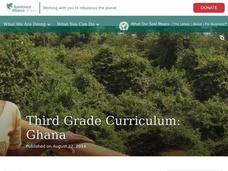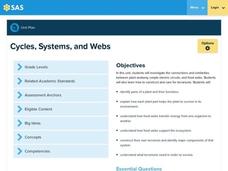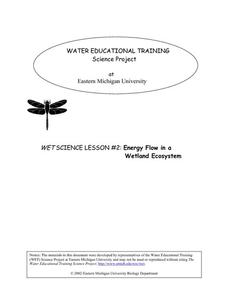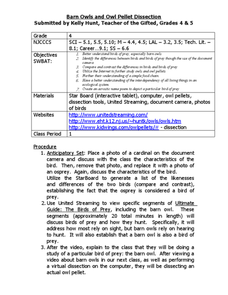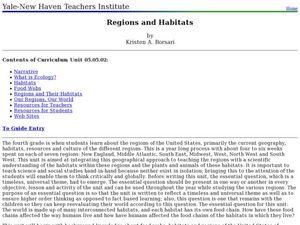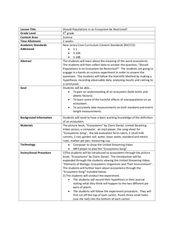National Wildlife Federation
Soil Decomposers
The class studies the soil food web that includes earthworms and conduct four experiments using the crawly critters. Individuals determine whether earthworms are sensitive to light, touch, temperature, and acid.
National Wildlife Federation
Habitat Web
It's all connected. Classes create a web to connect living things in a local ecosystem. They create cards with both living and nonliving things found in their areas while considering the characteristics of each. After they have a good...
Curated OER
Surviving in Our Ecosystems
Third graders investigate the balance of ecosystems and how each species has different survival needs. They research on the internet using the site included. They then participate in activities/centers utilizing the facts they discovered.
Curated OER
Prairie Food Chains & Webs
Students complete a food chain. In this ecosystem lesson, students learn about producers, consumers and decomposers. Students identify herbivores, carnivores and omnivores and complete two worksheets.
Pennsylvania Department of Education
Cycles, Systems, and Webs
Fourth graders review the parts of the plant and their functions. In this plant lesson plan, 4th graders recognize that plants must transfer energy to make food. Students understand the interdependence of organisms in an ecosystem.
Eastern Michigan University
Energy Flow in a Wetland Ecosystem
How is energy transferred within an ecosystem? What would happen to a food web if one of the organisms was removed? Elementary or middle school ecologists examine these questions and more in a comprehensive 5E learning cycle lesson....
Science Matters
That’s An Otter Story
Young scientists discover how sea otters' habitats have changed due to human impact. Through conversation, video observation, and story reading, scholars identify how human interactions change a specific ecosystem in both positive and...
Captain Planet Foundation
Energy Flow in the Garden
How can you tell what an owl has eaten? Study the food chain and flow of energy in an ecosystem by dissecting an owl pellet and noting the bones found inside. Additionally, the lesson plan includes a game about consumers and producers...
Chicago Botanic Garden
Ecological Mismatches
Modeling is a powerful teaching tool. The final installment in a six-part series has pupils complete an activity to model a food web and discover the interconnected relationships in an ecosystem. They then read about changes in migratory...
Curated OER
Marshland Ecosystems
Students identify animals in ecosystem depicted on 16th Century ceramic basin and classify them as herbivores, carnivores, or omnivores based on physical characteristics and prior knowledge, determine which life forms in ecosystem are...
Curated OER
Pond Ecology
A lab activity is a great way to incite thoughtful questioning and scientific processes. Pupils will collect organisms with a Petri dish, make observations, sketch the organism, ask questions, then attempt to identify the specimen...
NOAA
Seafood and Human Health
Whether your young biologists realize it or not, humans play a significant role in marine ecosystems. To help them understand this fact children first create graphical representations that show homo sapiens' place in marine food chains,...
Michigan Sea Grant
Food Chains and Webs
Starting with a simple food chain, young scientists interpret the difference and interrelatedness between herbivores, carnivores and producers. They answer questions related to cause and effect of food chain disruptions, including the...
Curated OER
Ecology - Food Chains
Learners discuss the concept of a food chain in the California ecosystem. in this food chain lesson plan, students look at different cards and sort them into herbivores, carnivores, decomposers, and omnivores. Then they use these cards...
Forest Foundation
The Web of Life
Producers, herbivores, carnivores, omnivores, decomposers. To begin a study of the forest ecosystem, learners examine the connections among the members of ecological communities.
Curated OER
5 Step Food Chain Lesson
Have your class discuss food chains using this resource. Learners watch a presentation on the food chain and how we are dependent on the smallest life forms. They write newspaper articles and create an illustration describing the food...
NOAA
Deep-Sea Ecosystems – Entering the Twilight Zone
Imagine an ecosystem without any light or oxygen, where living things convert carbon dioxide into food. This ecosystem is thriving and might just be the largest ecosystem on our planet, yet we know very little about it. The lesson...
NOAA
An Ocean of Energy
Young biologists trace the path of the sun's energy through marine ecosystems in the second part of this four-lesson plan series. Building on prior knowledge about producers, consumers, and decomposers students are introduced to the...
Curated OER
Barn Owls and Owl Pellet Dissection
Students explore birds of prey and food chains. In this ecosystems and birds of prey cross curriculum science and literacy lesson, students brainstorm characteristics of birds after viewing photographs. Students view a video and document...
Curated OER
Regions and Habitats
Fourth graders identify the different habitats found in the seven regions of the United States. For this ecology lesson, 4th graders write an essay about how humans affect the ecosystem and vice versa. They discuss how changes on one...
National Park Service
Living & Non-Living Interactions
What better way to learn about ecosystems than by getting outside and observing them first hand? Accompanying a field trip to a local park or outdoor space, this series of collaborative activities engages children in learning about the...
August House
Go to Sleep, Gecko
Use this multidisciplinary lesson to delve into these subjects: English language arts, math, science, drama, and character education. After reading, discussing, and making interpretations about Go To Sleep, Gecko!: A Balinese Folktale by...
Curated OER
Should Populations in an Ecosystem be Restricted?
Fourth graders experiment to determine how overpopulation effects ecosystems specifically plants. In this ecosystem lesson, 4th graders conduct an ecosystems experiment after listening to Claire Daniel's, Ecosystems. They watch a video,...
Curated OER
Ecosystem Tumble
Students create visual representations of ecosystems. In this ecology lesson, students discuss the interdependence of plants and animals in various ecosystems. Students cut pictures from magazines and glue them on sturdy blocks. Using...




